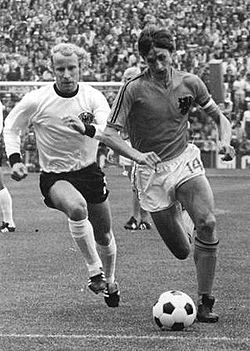Berti Vogts
Hans-Hubert "Berti" Vogts (German pronunciation: [ˈbɛʁtiː ˈfoːkts]; born 30 December 1946) is a German former professional footballer who played as a defender. He played for Borussia Mönchengladbach in the Bundesliga his whole professional club career and won the FIFA World Cup with West Germany in 1974. He later managed the national teams of Germany (winning Euro 96), Scotland, Nigeria and Azerbaijan. Club careerVogts joined the boys' football team of local sports club VfR Büttgen in 1954, at the age of seven, staying with them until his transfer in 1965 to Borussia Mönchengladbach. A right back, his tenacity earned him the nickname "Der Terrier".[1] He was one of the key players, along with Rainer Bonhof, Herbert Wimmer, Uli Stielike, Allan Simonsen and Jupp Heynckes, during Borussia's golden years in the 1970s, when it won the Bundesliga five times, the German Cup once, and the UEFA Cup twice. Vogts also played in the 1977 European Cup Final defeat by Liverpool.[2] Vogts made 419 Bundesliga appearances for Mönchengladbach, scoring 32 times, and also appeared 64 times for the club in European competition, scoring eight goals. Vogts remained with Mönchengladbach, until he retired from playing in 1979. International career Vogts played nine international boys' games for West Germany, made three appearances for the under 23s team, and has 96 senior caps, making him one of Germany's most capped players. He was captain for twenty of the senior games, scored one international goal and was also a member of the Germany national team that won the 1974 World Cup. Nicknamed "Der Terrier" for always fighting for every ball as if it were his last, Vogts was a big favourite with his home crowd. Vogts famously marked, and subdued, Johan Cruyff, in the final of the 1974 World Cup in Munich, West Germany, won by West Germany 2–1. During the match between West Germany and Austria on 21 June 1978, in the second round of the 1978 FIFA World Cup, he scored an own goal, allowing Austria to beat West Germany for the first time in 47 years, and preventing West Germany from moving on to the next round. In Austria, this match is fondly known as the Miracle of Córdoba. Managerial career West Germany and GermanyAfter his playing career ended, Vogts became coach of the West Germany under 21 national team, and continued in that role until 1990. Starting in 1986, he became an assistant manager of the senior national side. He was promoted to manager of Germany in August 1990, succeeding Franz Beckenbauer. After winning the 1990 FIFA World Cup Final the month before, Beckenbauer famously said that the reunified Germany will "probably be unbeatable for years",[3] a statement which turned out to be a burden for Vogts during the upcoming years. Although Vogts led the Germany national team to a Euro 1992 runner up finish and winning the next Euros in 1996, two World Cup quarter-final defeats in 1994 and 1998 are also on his sheet. He stepped down as manager in September 1998.[4] Bayer LeverkusenIn November 2000, after some time out of managing, he was appointed manager of Bayer Leverkusen. The following May, despite earning Bayer Leverkusen qualification for the Champions League, he was sacked. KuwaitThree months later, in August 2001, he became manager of the Kuwait national team.[5] ScotlandVogts resigned his position with Kuwait in January 2002, after six months in the post, to assume a similar position with the Scotland national team.[6] In qualifying for UEFA Euro 2004, Vogts took Scotland to a play off place, finishing second in their group to Germany. In the playoffs, Scotland were drawn against the Netherlands and Vogts led them to a 1–0 victory at Hampden Park, but the Netherlands beat Scotland 6–0 in the return leg. The Scottish press became notably more hostile towards Vogts following a series of defeats in friendly matches. A 1–1 draw with Moldova in October 2004 essentially put paid to Scotland's hopes of qualifying for the 2006 World Cup. Vogts resigned on 1 November, with a year and a half remaining on his contract, citing "disgraceful abuse".[7] Nine days after Vogts resigned, Scotland dropped to a record low of 77th place in the FIFA World Rankings.[8] NigeriaIn January 2007, Vogts was appointed manager of Nigeria, and signed a four-year contract. Nigeria were eliminated in the quarter finals of the 2008 African Nations Cup, which was their worst performance in the competition since 1982.[9][10] Vogts resigned from his position in February 2008.[11] Azerbaijan In April 2008, he was appointed manager of Azerbaijan, on a two-year contract.[12] In December 2009, he extended his contract with AFFA until the end of qualifying for UEFA Euro 2012, after successful results.[13][14] In March 2014, Vogts was appointed by Jürgen Klinsmann as a special advisor to the United States, for the 2014 World Cup.[15] In October 2014, he resigned from his position as Azerbaijan manager,[16] after a 6–0 defeat against Croatia.[17][18] Azerbaijan had lost all of their first three matches in UEFA Euro 2016 qualifying Group H.[18] Under Vogts, Azerbaijan had some poor results, not being able to win against second string sides, forcing Vogts to face major criticism from local supporters and the media.[19][20] United StatesIn March 2015, Vogts was appointed by the United States national team as a technical advisor.[21][22] After the dismissal of Jürgen Klinsmann, Vogts' employment also ended.[23] Career statistics
Managerial statistics
HonoursPlayerBorussia Mönchengladbach
West Germany Individual
ManagerGermany Individual References
External linksWikimedia Commons has media related to Berti Vogts. |
|||||||||||||||||||||||||||||||||||||||||||||||||||||||||||||||||||||||||||||||||||||||||||||||||||||||||||||||||||||||||||||||||||||||||||||||||||||||||||||||||||||||||||||||||||||||||||||||||||||||||||||||||||||||||||||||||||||||||||||||||||||||||||||||||||||||||||||||||||||||||||||||||||||||||||||||||||||||||||||||||||||||||||||||||||||||||||||||||||||||||||||||||||||||||||














